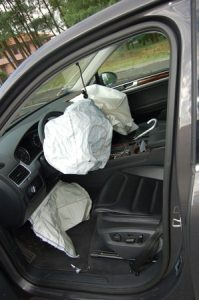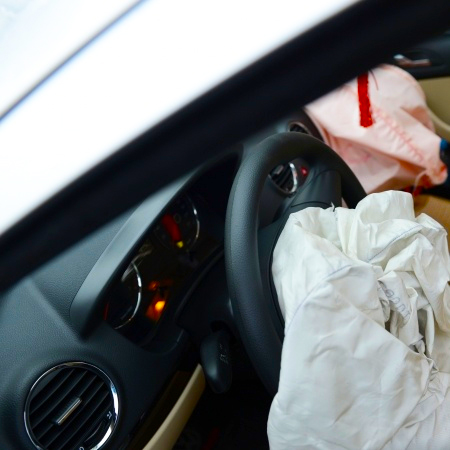Posts Tagged ‘Takata’
Takata Airbag Recalls Continue in 2018
 The National Highway Traffic Safety Administration (NHTSA) has expanded the Takata airbag recall by 3.3 million vehicles. The question now is how many more recalls are ahead?
The National Highway Traffic Safety Administration (NHTSA) has expanded the Takata airbag recall by 3.3 million vehicles. The question now is how many more recalls are ahead?
So many drivers have been impacted. To date, 34 million vehicles have been recalled, according to the NHTSA website. USA Today reports the airbags are now responsible for at least 20 deaths, while injuring 180 others. Millions of other drivers have had to wait out a slow replacement process.
The U.S. Department of Justice fined Takata $1 billion early last year. Because there are so many defective airbags, the NHTSA plans to issue phased recalls through December 31, 2019. Older vehicles and those in hot and humid states have received the highest priority. The schedule is designed to repair vehicles before the chemical in the inflator starts to break down.
Background
Even as we drove cars with its airbags, many of us had never heard the name Takata until 2014. This was a hard-to-forget year, bringing two of the largest auto recalls in U.S. history. First came G.M., which was forced to recall millions of vehicles with faulty ignition switches. The company went on to pay a record $35 million fine for failure to report the defect. Mary Barra, chairman and CEO of G.M., had to answer to lawmakers on Capitol Hill.
Then came Takata, the subject of that now famous New York Times report. The Times reported that Takata employees had tested airbags and the company knew they were defective years before speaking up. Under federal law, manufacturers have five days to report defects to the federal government.
The U.S. Department of Justice fined Takata $1 billion in January 2017. At the same time, it charged three Takata executives with wire fraud and conspiracy. The fine included $850 million in restitution for automakers who purchased the defective airbags. Another $125 million was set aside for those injured and their families.
What Drivers Should Know Going Forward
Takata airbags use ammonium nitrate inside the airbag’s inflator. When exposed to hot temperatures and humidity, the chemical can become volatile, exploding and shattering metal pieces into the vehicle.
The new recall is for frontal airbags in certain 2009, 2010 and 2013 vehicles made by 15 automakers. The automakers will provide more information about specific models in a few weeks.
If your car is not impacted, that is great news. But your vehicle may be subject to a future recall. Takata has to file five reports with the NHTSA. The fourth and fifth notices are due December 31, 2018 and December 31, 2019.
If your vehicle has defective airbags, call your dealer immediately to schedule a repair. Other drivers can stay informed.
The NHTSA urges drivers to check Safercar.gov or use its Recalls Lookup Tool periodically. If you check it today, remember that vehicles from the latest recall will be added in a few weeks. You can also sign up for recall alerts and check to make sure your vehicle’s registration is up to date. You want to make sure the manufacturer can contact you without delay.
About Breakstone, White & Gluck
The Boston product liability attorneys at Breakstone, White & Gluck have over 100 years combined experience representing those who have been injured as a result of someone else’s negligence. If you have been injured by a defective product, learn your rights. For a free legal consultation, contact us at 800-379-1244 or 617-723-7676 or use our contact form.
Former Employees: Takata Hid Airbag Defects
 Long before the deaths and injuries, Takata knew its airbags were defective, according to two former employees of the company.
Long before the deaths and injuries, Takata knew its airbags were defective, according to two former employees of the company.
In fact, Takata knew about the defects as far back as 2004, the workers told The New York Times. The Japanese company learned one of its airbags exploded and sent metal debris spewing at a driver in Alabama, then began secret testing at its U.S. headquarters in Michigan. The testing was conducted outside normal work hours and was never disclosed until now. Three months into testing, employees began to theorize the problem was the welding on the airbag’s inflator canister, but the investigation was shut down and employees were instructed to destroy all testing data.
It took Takata four years to report the faulty airbags in a regulatory filing. In November 2008, the first Takata airbags were recalled.
The law requires car manufacturers to report safety defects to the government within five days once they are identified. This year has seen the most auto recalls in U.S. history and some hefty fines for Toyota and General Motors for failing to disclose defects. In March, Japan-based Toyota agreed to pay $1.2 billion to the U.S. government to avoid prosecution for hiding “unintended acceleration” defects. In May, General Motors was ordered to pay a record $35 million civil fine for failing to disclose deadly ignition switch defects.
Starting in 2008, Takata’s airbag recalls continued slowly, then got a big push last month from the National Highway Traffic Safety Administration (NHTSA). NHTSA issued a consumer advisory which urged drivers to immediately check if their vehicle’s airbags had been recalled and arrange for a repair. To date, 11 car manufacturers have recalled more than 14 million vehicles worldwide. Four deaths have been linked to the defective airbags and at least 139 people have been injured.
A few notes about this story:
Check Your Car. Every driver should check if their car has been recalled at SaferCar.gov. You can also read our blog for answers to many common consumer questions. Most impacted drivers will have to wait for replacement airbags so it is best to call your local dealer as soon as possible. Some carmakers are advising drivers not to carry passengers until their airbags have been replaced.
Why the Airbags are Defective. The airbags are defective because they have a steel canister which can crack when the device deploys in a car crash, sending metal, plastic and chemicals exploding at drivers and front seat passengers. The airbags have an inflator, which is comprised of a propellant based on a common compound used in fertilizer.
Honda. One question going forward is: How much did Honda know? This matters because Honda made more than 5 million of the recalled vehicles. The New York Times reports a 2002 Honda Accord was involved in the 2004 accident in Alabama. Honda officials say Takata assured them the accident in which a driver was injured by a ruptured airbag was an “anomaly.” Honda settled the case with the driver but Takata began its own secret testing, according to the employees. The NHTSA has ordered Honda to produce all its documents related to the Takata airbag recall by Dec. 15, so we may learn more then.
About Breakstone, White & Gluck
The Boston product liability lawyers at Breakstone, White & Gluck have over 100 years combined experience representing clients injured by negligence in Massachusetts. If you have been injured, learn your rights. For a free legal consultation, contact us at 800-379-1244 or 617-723-7676 or use our form.

